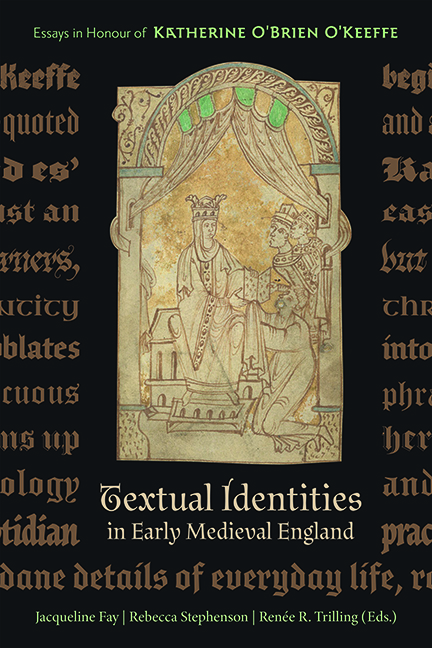Book contents
- Frontmatter
- Contents
- List of Illustrations
- List of Contributors
- Acknowledgments
- List of Abbreviations
- Introduction
- Part One Affect and Embodied Cognition in Medieval Didactic Texts
- Part Two Sovereignty, Power, and English Textual Identities
- Part Three Acts of Public Record in Making and Sustaining Communities
- Overview Of Career
- The Writings of Katherine O’Brien O’Keeffe
- Bibliography
- Index of Manuscripts
- General Index
- Tabula Gratulatoria
- Anglo-Saxon Studies
6 - A Taste for the Law: The Preface to Alfred's Law Code and Hannah Arendt's Reading of Kant
Published online by Cambridge University Press: 26 May 2022
- Frontmatter
- Contents
- List of Illustrations
- List of Contributors
- Acknowledgments
- List of Abbreviations
- Introduction
- Part One Affect and Embodied Cognition in Medieval Didactic Texts
- Part Two Sovereignty, Power, and English Textual Identities
- Part Three Acts of Public Record in Making and Sustaining Communities
- Overview Of Career
- The Writings of Katherine O’Brien O’Keeffe
- Bibliography
- Index of Manuscripts
- General Index
- Tabula Gratulatoria
- Anglo-Saxon Studies
Summary
LIKE MANY of the works associated with Alfred of Wessex and his court, the law code issued in the king's name comes equipped with a long and complicated preface laying out the text's intellectual goals. In the case of the law code, this is nothing less than the sacred history of written law. The prologue begins with the Ten Commandments and proceeds to excerpts from Deuteronomy, and then to the New Testament. Tellingly, as it turns to the new dispensation, the text cites Jesus's confirmation of the written Law in Matthew 5:17 – rather than, say, the Great Commandment, or the many other spoken injunctions in the Sermon on the Mount which constitutes the whole of Matthew 5. It then continues on to the letter sent by the apostles in Acts 15, as the first written regulation of the new church among the Gentiles, appending to it a version of the Golden Rule; and then turns its attention outward, to the ‘monega seonoðas’ [‘many synods’] assembled throughout the various Christian nations, whose judgments were duly recorded ‘on monega senoðbec’ [‘in many synod-books’].
The narrative of the prologue, in other words, seems to portray the growth of law as like that of a tree: retaining, while it expands ever outward, an unchanging core within, so that it includes and is supported by its own prior state. This majestic image, however, is disrupted by the prologue's final paragraphs. Written in the voice of the king, this section seems to offer a startlingly arbitrary approach to the secular law of the English kingdoms:
Ic ða Ælfred cyning þas togædere gegaderode 7 awritan het, monege þara þe ure foregengan heoldon, ða ðe me licodon; 7 manege þare þe me ne licodon ic awearp mid minra witena geðeahte, 7 on oðre wisan bebead to healdanne. Forðam ic ne dorste geðristlæcan þara minra awuht fela on gewrit settan, forðam me wæs uncuð, hwæt þas ðam lician wolde ðe æfter us wæren. Ac ða ðe ic gemette awðer oððe on Ines dæge mines mæges, oððe on Offan Mercna cyninges oððe on Æþelbryhtes, þe ærest fulluhte onfeng on Angelcynne, þa ðe me ryhtoste ðuhton, ic þa heron gegaderode, 7 þa oðre forlet.
- Type
- Chapter
- Information
- Textual Identities in Early Medieval EnglandEssays in Honour of Katherine O'Brien O'Keeffe, pp. 135 - 149Publisher: Boydell & BrewerPrint publication year: 2022

